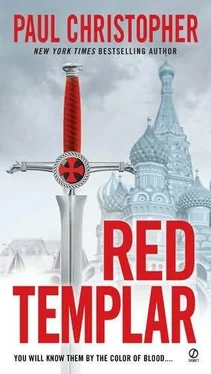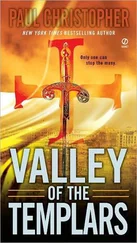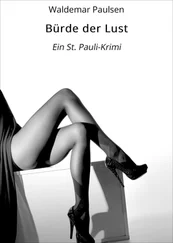Paul Christopher - Red Templar
Здесь есть возможность читать онлайн «Paul Christopher - Red Templar» весь текст электронной книги совершенно бесплатно (целиком полную версию без сокращений). В некоторых случаях можно слушать аудио, скачать через торрент в формате fb2 и присутствует краткое содержание. Жанр: Политический детектив, на английском языке. Описание произведения, (предисловие) а так же отзывы посетителей доступны на портале библиотеки ЛибКат.
- Название:Red Templar
- Автор:
- Жанр:
- Год:неизвестен
- ISBN:нет данных
- Рейтинг книги:3 / 5. Голосов: 1
-
Избранное:Добавить в избранное
- Отзывы:
-
Ваша оценка:
- 60
- 1
- 2
- 3
- 4
- 5
Red Templar: краткое содержание, описание и аннотация
Предлагаем к чтению аннотацию, описание, краткое содержание или предисловие (зависит от того, что написал сам автор книги «Red Templar»). Если вы не нашли необходимую информацию о книге — напишите в комментариях, мы постараемся отыскать её.
Red Templar — читать онлайн бесплатно полную книгу (весь текст) целиком
Ниже представлен текст книги, разбитый по страницам. Система сохранения места последней прочитанной страницы, позволяет с удобством читать онлайн бесплатно книгу «Red Templar», без необходимости каждый раз заново искать на чём Вы остановились. Поставьте закладку, и сможете в любой момент перейти на страницу, на которой закончили чтение.
Интервал:
Закладка:
“We’ve got the same thing in the States.” Holliday smiled.
“Yes, well, it seems that tomorrow there are to be six funerals of people from Novoye Devyatkino, three Orthodox, two nondenominational and one Jewish. The Jewish cemetery is in Obukhovo in the far southern part of the city. The Orthodox cemeteries are at the Alexander Nevsky Monastery in Ligovka-Yamskaya in the east, and the two nondenominational funerals are being held at the Novodevichy Cemetery near the Moscow Triumphal Gate.
“All of the cemeteries are at least an hour away by metro from Novoye Devyatkino. Three of the interments are scheduled to take place at eleven in the morning, two will take place at one in the afternoon, and one will take place at two. During those periods the apartments of the deceased will presumably be vacant.” The Russian grinned ghoulishly. “I have known very few corpses who took their passports, identification and wallets with them to the grave.” There was a long silence.
“?Es brillante!” Eddie whispered finally, eyes wide.
Genrikhovich beamed. He looked at Holliday. “What do you think?”
“Victor,” said Holliday, “I think we may have seriously underestimated your potential. You have a truly criminal mind.”
18
The apartment occupied by the late Ostap Obelovich Cheburashka and his wife, Tatanya, was located in one of the older high-rises in Novoye Devyatkino. The simple lock had been easily slipped with a credit card. The apartment was a three-room affair with a living room/dining room, a kitchen and a bedroom. Presumably there were toilet and bathing facilities elsewhere on the floor. A mezuzah was stuck to the doorframe, and a menorah sat on an old, scarred sideboard, the nine candles no more than inch-long stubs. Ostap Obelovich had died just in time. Beside the menorah were pale, overexposed photographs of a young man and his wife, the man the picture-perfect proletarian worker, the young woman virginal and expectant. Khrushchev’s Russia and the new Five-year Plan, a plan that had gone on forever and finally come to nothing. The apartment smelled of borscht and cigarettes and lemon vodka and failed dreams. Somewhere along the way Ostap Obelovich had lost the young wife, because there was no sign of her in the apartment. The bed was single, the clothes were all his and there was dust everywhere.
In the bedroom someone had laid out a lace doily on Ostap Obelovich’s dresser, atop which lay a ring, a watch, a worn plastic wallet and a bar of medals. The watch was an old Pobeda “Victory” from before World War II, probably given to Ostap by his father, Holliday guessed. Among the medals, he recognized the Afghan medal of valor. There was also a photograph in another silver frame, this one showing an older, bearded Ostap, half in and half out of the turret of an Ob’yekt 166K T-62K main battle tank. Holliday recognized the terrain-Afghanistan, not too far from Kabul. ’Seventy-nine to ’eighty-nine, a decade of loss, frustration and in the end humiliation and the first real sign that the Russian bear was a little sickly and not the threat that it once had been. If the CIA had been keeping a more careful watch, they would have seen the first critical chink in the armor that led to the collapse of Karl Marx’s perfect state a few years later.
The final truth of the man named Ostap Obelovich Cheburashka stood half-hidden in the shadows beside the dresser. A thing of worn leather straps and rivets and pink-enameled aluminum that had served as Ostap Obelovich’s right leg, almost certainly taken in Afghanistan, where Holliday had lost his eye. Different war, different time, same place, which was how it always was, going back to the days of Alexander. People killing and dying for the same pieces of land for millennia. A leg lost for what? Some posturing general in the Kremlin? It was all a waste, no matter which side you were on.
“Bad thoughts?” Eddie asked quietly.
“Sad ones,” said Holliday. And then he did what a good soldier always did-put the thoughts away and got down to business. Twenty minutes later, with the dead man’s passport, transit papers, veteran’s identification and wallet, they left the apartment and headed to the next address on their list. Holliday had left the watch, the ring and the medals behind. By midafternoon they had three new identities and headed back to the dacha in Novoye Devyatkino.
They spread their haul out on the plain maple table in the kitchen. They’d had enough time to get into all six of the apartments on the list with little or no difficulty, but they’d abandoned two, one because of the advanced age of the deceased-there was no way any of the three men would pass as Pyotr Fomitch Kalganov, a ninety-three-year-old retired schoolteacher, or Ismail Gasprinsky, a Crimean Tatar with a bit of Cossack thrown in.
“Okay,” said Holliday, “I’m Dimitri Valentin, Victor is Ostap Cheburashka and Eddie is Vladislav Nikolayevich Listyev, and his story is that he is the bastard child of a professor and his young African student at Patrice Lumumba University. He’s lived his whole life in Russia, which is why he speaks the language so well.” Holliday picked up one of the transit passes allowing the bearer to travel outside his own city. “And just thank God these are probably the only documents we’ll need to show, because trying to doctor the passports just won’t work, and from the looks of it the late Dimitri Valentin spent his whole life working at the Leningrad Steelworks before he got laid off in 1990. If we get seriously looked at by anyone, my advice is to run like hell, because these things won’t stand up to any kind of scrutiny.”
“Ahora bien,” said Eddie. “?Que hacemos?”
“What now?” Holliday said. Eddie nodded. Holliday turned to Genrikhovich. “Good question,” he said. “What now?”
There was a long silence. Genrikhovich pursed his lips and pushed his spectacles higher up his long, thin nose. He nodded finally and began to speak.
“I have thought on this,” said the Russian. “And again we are linked to history. The Kremlin Egg, the one that actually sits in its display cabinet in the Kremlin Armoury with all the other great treasures of the Romanovs, is a fake-brilliantly made, certainly, but a fake nevertheless. We know this fake was made sometime between 1904 and 1934 for some purpose-most likely to keep whatever secret it holds safe and away from people like Stalin or more likely Lavrenti Beria, who we discovered was involved at least as far back as 1944, when he received the third sword.”
“Polaris, Sword of the North,” said Holliday.
“Precisely,” said Genrikhovich. “He may well have deciphered whatever the message was on the sword, or perhaps not. If the message led him to the Kremlin Egg, as I think it did, then he would have been frustrated by the copy.”
“That doesn’t do much for us,” said Holliday. “The egg could have been switched at any time-the mark on the base indicates when it was made; it gives us no clue as to when the egg was exchanged.”
“Not anytime, Colonel Holliday-it could only have been exchanged on one occasion.”
“When?”
“Stalin had used the Romanov eggs and other czarist treasures as a way of getting foreign currency. He even ordered five hundred paintings and sculptures in the Hermitage to be auctioned. This is how your Armand Hammer, the baking soda tycoon, came into possession of so many of the eggs.”
“Is there a point to this?” Holliday asked, a little irritated. Genrikhovich had an annoying habit of going the long way to get where he was going.
“Context, Colonel Holliday. As you know perfectly well, history is context.”
“Jesucristo.” Eddie groaned softly.
Читать дальшеИнтервал:
Закладка:
Похожие книги на «Red Templar»
Представляем Вашему вниманию похожие книги на «Red Templar» списком для выбора. Мы отобрали схожую по названию и смыслу литературу в надежде предоставить читателям больше вариантов отыскать новые, интересные, ещё непрочитанные произведения.
Обсуждение, отзывы о книге «Red Templar» и просто собственные мнения читателей. Оставьте ваши комментарии, напишите, что Вы думаете о произведении, его смысле или главных героях. Укажите что конкретно понравилось, а что нет, и почему Вы так считаете.











